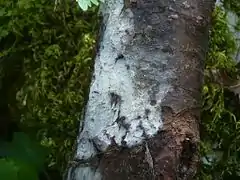| Xenasmataceae | |
|---|---|
 | |
| Xenasma pulverulentum | |
| Scientific classification | |
| Kingdom: | |
| Division: | |
| Class: | |
| Order: | |
| Family: | Xenasmataceae Oberw. (1966) |
| Type genus | |
| Xenasma Donk (1957) | |
| Genera | |
| Synonyms[1] | |
The Xenasmataceae are a family of crust fungi in the order Polyporales. The family was circumscribed in 1966 by German mycologist Franz Oberwinkler with Xenasma as the type genus.[3] As of April 2018, Index Fungorum accepts 28 species in the family.[4] Xenasmataceae fungi grow as saprobes on fallen wood and are known primarily from temperate areas.[5]
Description
Fruit bodies of Xenasmataceae fungi are usually crust-like, with a waxy or gelatinous texture. The fungi have a monomitic hyphal system, and the hyphae are frequently gelatinous. Spores are translucent, and often stain with Melzer's reagent.[5]
References
- ↑ "Xenasmataceae Oberwinkler 1966". MycoBank. International Mycological Association. Retrieved 12 April 2012.
- ↑ Parmasto, Erast (1968). Conspectus Systematis Corticiacearum (in Latin). Tartu, Estonia: Institutum zoologicum et botanicum Academiae scientiarum R.P.S.S. Estonicae. p. 58.
- ↑ Oberwinkler, Franz (1965). "Primitive Basidiomyceten. Revision einiger Formenkreise von Basidienpilzen mit plastischer Basidie". Sydowia (in German). 19 (1–6): 1–72 (see p. 25).
- ↑ Kirk, P.M. (ed.). "Species Fungorum (version 28th March 2018). In: Species 2000 & ITIS Catalogue of Life". Archived from the original on 2 January 2020. Retrieved 9 April 2018.
- 1 2 Cannon, P.F.; Kirk, P.M. (2007). Fungal Families of the World. Wallingford, UK: CAB International. p. 379. ISBN 978-0-85199-827-5.
This article is issued from Wikipedia. The text is licensed under Creative Commons - Attribution - Sharealike. Additional terms may apply for the media files.